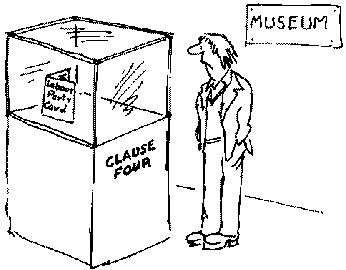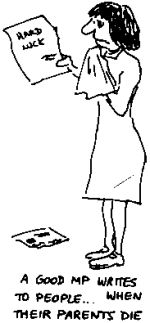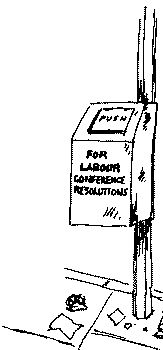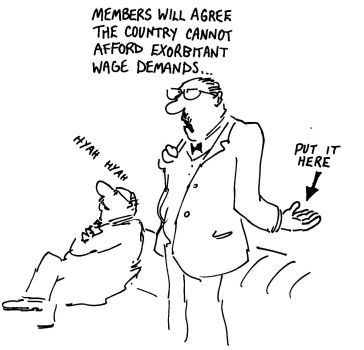
MIA > Archive > P. Foot > Why you should be a socialist
‘The Labour Party is a moral crusade – or it is nothing’.
Harold Wilson, Scottish Labour Party conference, Rothesay, May 1964.
‘But I don’t think we now see ourselves as crusaders. I think we have become very much defenders of what we have got that rather than campaigners for more.’
Colin Ware, leader of the Labour-controlled council at Haringey, North London, explaining his council’s decision to break previous promises by accepting across the board cuts in council spending, October, 1976.
 |
For a very long time, the British Labour Party has declared itself opposed to capitalism and the profit system. In 1918, the Labour Party drew up its constitution. Clause 4 of that constitution is still printed on the card of every Labour Party member. It says that the fundamental aim of the Labour Party is ‘to secure for the workers by hand or by brain the full fruits of their industry’. How? By the ‘common ownership of the means of production, distribution and exchange.’
From the earliest days, Labour Party leaders spoke up for socialism and common ownership against capitalism and private ownership. In 1923, the Parliamentary Labour Party in Parliament, which then had 143 members, forced a two-day debate on a motion moved by Philip Snowden. The motion read:
‘That, in view of the failure of capitalism to adequately utilise and organise natural resources and productive power, or to provide the necessary standard of life for vast numbers of the population, and believing that the cause of this failure lies in the private ownership and control of the means of production and distribution this House declares that legislative effort should be directed to the gradual supersession of the capitalist system by an industrial and social order based on the public ownership and democratic control of the instruments of production and distribution’.
Ramsay MacDonald, Labour’s leader at that time, closed the debate with a rousing attack on the profit system. ‘I am perfectly satisfied’ he said ‘that the capitalist system has to be supplanted by socialism’.
Clement Attlee, who led the Labour Party from 1937 to 1955, wrote, in the year he became leader:
‘The dominant issue of the 20th century is socialism. The Labour Party is the expression in Great Britain of a worldwide movement ... The aim of the Labour Party is the establishment of a Co-operative Commonwealth’.
Labour’s programme, 1973, started:
‘We are a democratic party and proud of it. We put the principles of democracy and socialism above consideration of privilege and market economies. We aim to bring about a society based on cooperation instead of competition; where production is for people’s needs, not for private profit’.
All these statements, and thousands of similar ones, have been made when the Labour Party was in opposition. The history of Labour in opposition is a history of anti-capitalist, socialist talk and anti-capitalist, socialist promises. But for eighteen years in the last sixty, Labour has been in government. And in all those eighteen years, it has carried out policies which have strengthened capitalism and weakened socialism.
In 1924 and 1929 a minority Labour Government strained every muscle to follow policies which suited the profit system. When unemployment reached three million in 1931, the Labour Government’s only solution was to cut the dole money. The trade unions refused to agree, and the Labour leaders, including Ramsay Macdonald and Philip Snowden, joined the Tories in a National Government which oppressed the workers for nine long years.
After the war, a Labour government was elected on a huge wave of socialist enthusiasm with a Parliamentary majority of 145. For a short time it looked as though the government was carrying out its promises and changing society. It nationalised the public utilities, together with coal and railways which had become hopelessly unprofitable – after paying out hundreds of millions in compensation to the old coal and rail owners, who were already some of the wealthiest people in the country. It established on a permanent basis a number of social services which had effectively been in operation during the war. But on the crucial question of control over industry the government did all in its power to restore control to private businessmen and financiers. Labour’s ‘great government’ left capitalism stronger in 1951 than it had been in 1945.
Labour didn’t get back until 1964, when their leader was Harold Wilson. Wilson had campaigned for a ‘new Britain’ in which the wonders of modern science would be harnessed to peoples’ needs. Under his government, which lasted for six years, and was reinforced with a big majority in the 1966 election, all the promises faded into the air. In their place were tough Tory policies – wage freeze, cuts in public spending, rises in health prescription and school milk charges; the postponement of the raising of the school leaving age; supporting American atrocities in Vietnam. Labour’s support dwindled, and Labour was kicked out of office in the 1970 election.
Since 1974 when Labour was again elected, the Labour government has sunk to previously undreamt-of depths of humiliation. The fine phrases of Labour’s programme, 1973, have been turned on their head. Labour Ministers have ripped up almost every commitment they made to their supporters and to the electorate; they’ve cut the subsidies which they promised to increase; they’ve agreed to Common Market food taxes, which they promised to abolish; they’ve used unemployment as a weapon against inflation, as they promised not to do; they’ve abandoned all their pledges to ‘extend the Health Service’ or public education, or to levy a tax on wealth. On the other hand, they’ve agreed to cuts in corporation tax; staggering increases in ‘investment incentives’; and relaxations of price restraint.
Denis Healey boasted in an interview for Business Week in Summer 1976 that he had ‘done more’ for business than any other previous Chancellor.
Why? How can we explain this astonishing difference between what Labour Party people say and hope for when the Party is in opposition, and what Labour governments do?
The short answer is in a three-syllable word which appears in the commitment to common ownership in the Party constitution. To secure for the workers by hand or brain the full fruits of their industry’. The same emphasis can be found in Philip Snowden’s portentous motion in the House of Commons in 1923: ‘Legislative effort should be directed to the gradual suppression of the capitalist system.’
Before the workers had the vote, people who argued for socialism argued automatically for the revolution. In those times, all the instruments of power – factories, banks, and Parliament – were exclusively in the hands of the rich. There was no means of getting control of any of these things except by taking the wealth in a revolution. But then, gradually, and at different times in different parts of the world, the workers started to win the right to vote in elections for Parliament and local councils.
Many socialists thought that the right to vote provided a new road to socialism: The Parliamentary Road. They argued that if Parliament and local councils could be won in free elections by workers’ representatives, then the seat of political power would be transferred from capitalists to workers. Labour governments would then be able to pass laws which would roll back the capitalist system and eventually establish a co-operative commonwealth.
The proposition seemed very attractive. It entailed none of the violence and uncertainty of revolutions. Specific programmes could be drawn up for specific elections and specific parliaments, which would then be carried out. Since everyone recognised the ‘sovereignty of Parliament’ the wealthy class would be forced to accept Parliament’s laws, and surrender its property.
In Britain, these ideas very quickly won the approval of millions of workers. After 1867, when skilled workers in the cities had got the vote, the workers traditionally voted for the capitalist Liberal Party. The Labour Party came into being to win votes for an independent working class party. That meant campaigning.
It meant that the Labour Party had to set up newspapers and publish propaganda leaflets by the million. It meant that the Labour Party had to set up groups in factories and workplaces to convince people around them of the case for a working class party in Parliament. It meant that elections became great battles for allegiances, in which the old ruling class representatives used every trick in the book to keep the workers on their side.
This campaigning continued all the way to the first Labour majority government in 1945 and even up to the two elections in 1950 and 1951, when more people voted Labour than ever before or since. But once it became established that the majority of workers would vote Labour, the campaigning slowed down. The mass vote was now assured. The Labour Party outside parliament became a machine for pulling that vote into the polling booth. The party began to focus exclusively on what was happening inside parliament.
The collapse of the Labour Party outside Parliament was not an accident or something that is likely to change. It is an inevitable and continuous development. Here are the figures for individual membership of the Labour Party since its peak year in 1952.
|
1952 |
1,014,144 |
|
|
1964 |
840,116 |
|---|---|---|---|---|---|
|
1953 |
1,004,685 |
1965 |
816,765 |
||
|
1954 |
933,657 |
1966 |
775,693 |
||
|
1955 |
843,356 |
1967 |
733,932 |
||
|
1956 |
845,129 |
1968 |
700,850 |
||
|
1957 |
913,987 |
1969 |
680,656 |
||
|
1958 |
888,955 |
1970 |
680,191 |
||
|
1959 |
847,526 |
1971 |
699,522 |
||
|
1960 |
790,192 |
1972 |
703,030 |
||
|
1961 |
750,560 |
1973 |
665,379 |
||
|
1962 |
767,459 |
1974 |
691,889 |
||
|
1963 |
830,340 |
1975 |
669,187 |
These are the published figures, but everyone knows that they are bogus. Labour headquarters insist on a minimum affiliation of a thousand members for every constituency. In many areas there are today no more than a handful of Labour activists, and many of them are active in the sense that they want one day to be councillors. But even these bogus figures tell of a catastrophic decline – and a decline which turns into a rout during periods of Labour government.
The disintegration of the Labour Party outside parliament is not just in membership. What used to be a formidable propaganda machine has now been wound up. In 1920, the Labour Party bought the Daily Herald. For thirty-eight years the Herald was either owned or half-owned by the Labour Party or the TUC. At one time, the Herald had a circulation of more than three million. But in 1958, when the circulation was still more than two million, the TUC sold its stake to a capitalist newspaper proprietor. Similarly, the Cooperative Party sold off and closed its Sunday paper, Reynolds News. Labour no longer had any need for any newspapers, since its main concern was in Parliament.

There have been no Labour party groups in factories since the 1920’s, and the Party does not encourage them. Education bodies which were kept alive by local Labour Parties, such as the Plebs League and the National Council of Labour Colleges, have been wound up. At the same time the relationship between Labour MPs and constituents which used to be political has now deteriorated into the relationship between social worker and client. When people say nowadays: ‘He’s a good constituency MP’, they mean he takes trouble to write to people when their parents die. They mean that he passes on ‘cases’ promptly to the council or the relevant ministry and is very polite when showing schoolchildren round the House of Commons. They do not mean that he organises political discussion or report-back meetings or debates or indeed anything to spread the socialist message outside his own coterie of MPs and lobby correspondents.
Labour MPs and candidates have a simple message for their supporters: take it easy, and we will do the job for you. Do not rock the boat or make things difficult for us. Do not go on strike. Do not demonstrate. Do not discuss, or argue or organise or think. All these matters can be left to the chosen few who will secure for the workers by hand or by brain the full fruit of their industry; and will pass the laws necessary to ensure that the gradual supersession of capitalism will come to pass.

Meanwhile, what happens in parliament? The chosen few quickly discover that legislation to secure for the workers the full fruits of their industry is not such an easy matter as it originally appeared. To start with, there is the beastly ‘crisis’ which always seems to blow up on the horizon as soon as a labour government starts to get into its stride. In 1948, 1964, 1966, 1967 and in 1974, 1975 and 1976 the labour government was dogged by crises. Usually, these were sterling crises, started by the sale of sterling, here or abroad. Labour MPs and governments, though they imagined themselves the supreme power in the country, did not control the sale of sterling. This was controlled by other people, bankers, foreign exchange dealers, the treasurers of multinational companies, none of them elected by anyone. Sterling sales forced the abandonment of Labour’s economic policies in November 1964. They forced the cuts and the wage freeze of July 1966; the wage control policies of the Labour government in 1975 and 1976; and the public spending cuts of 1976 (March and August). As I write this pamphlet they are about to force some new concession from a labour government which can do nothing about the sale of sterling except obey the orders of the people who are selling it.
Sales of sterling are not the only way in which the corporations and bankers use their power to humble labour governments. The ‘investment strike’ is another familiar weapon. In 1967, Shell wanted to invest in a chemical complex. They wanted to do a deal with other chemical giants to ensure that no one else built a chemical complex. Such an agreement was against the Restrictive Practices Act, which was passed to ensure ‘genuine competition’. Shell told the labour government: either you repeal the relevant clause in the Act, or we won’t invest and you won’t get the jobs.
The clause was repealed. In 1975 the oil companies protested to the Labour government about the profits tax of ninety per cent proposed for North Sea oil. The companies said that unless the tax was cut they would not excavate the oil. So the government cut the tax to seventy-five per cent, thus losing about £1000 million a year. In 1976, Tate and Lyle wanted to take over Manbre and Garton, and so ensure that almost the entire British sugar industry was controlled by one board of non-elected people. The government wanted to refer the matter to the Monopolies Commission, but they were told: ‘If you do, we won’t merge and we’ll have to put up prices’. So the matter didn’t go to the Monopolies Commission, and the prices went up anyway.
Small matters? Perhaps, but they are only examples of the million and one methods by which the unelected, irresponsible power of corporations, bankers, and the like is exerted over an elected government, even in the rare cases where that government is hostile to its interests. These methods are shored up by a whole host of lobbyists, PR-men, slush funds, foreign trips, free lunches and perks for MPs. All such pressures, by their nature, come from rich people and their companies.
The influence on MPs and governments is not only exerted by businessmen and bankers. All the other sections of the allegedly neutral state operate in the interests of the wealthy classes – if necessary, against the government.

Here’s a contemporary example. In 1972 and 1973, the local authority of Clay Cross, which consisted of ten working men and one working woman, challenged the Tory government’s Housing Finance Act, which insisted on council house rent increases. Pleading that they too were elected representatives, they refused to put up the rents. The government took them to the courts, where they were fined and debarred from future office. They were also ordered to pay a surcharge to make up for the amount gained by Council tenants in non-payment of increased rents.
The Labour Party in opposition was very angry. At its 1973 conference it passed a motion instructing the next Labour government to remove the fines, the immunities and the surcharge. The next labour government was elected four months later. One of its first decisions was not to remove the fines or the surcharges. As a result, the eleven working class people who stood by Labour’s policies were humiliated and bankrupted under a Labour government, and the Clay Cross Labour Party has been reduced to a laughing stock.
The government refused to remove the fines or the surcharges because, as Environment Minister Tony Crosland put it: ‘We respect the rule of law’. The government, as part of its philosophy, preferred to respect the ‘independence of the judiciary’ rather than pay back its own supporters. Why? Because, so the theory ran, unless Labour accepts judges’ decisions, the judges cannot be expected to remain neutral and above party politics.
Two years later, the newly-elected Tory authority at Tameside Manchester decided to flout the government instructions and laws which demanded that selective schools be disbanded and comprehensive schools established. The Tories of Tameside insisted on keeping their selective schools. They appealed to the courts. The first court found that the government has the right to decide. The council appealed. The Court of Appeal, headed by the same Lord Justice who had insulted the Clay Cross councillors, upheld the Tory council’s right to decide! The Labour Minister of Education then appealed to the House of Lords, who unanimously upheld the court of appeal.
What did the independence of the judiciary come to, after all? It came to the independence of a handful of rich and bigoted men to decide educational policy. The ‘rule of law’ was the rule of wealth and privilege – in the cases of Clay Cross and Tameside. The government was allowed to overrule the council in the one case, the council was allowed to overrule the government in the other. The rule of wealth took precedence over the rule of the elected government.
Or another example. In May 1974, the Protestants of Northern Ireland went on strike. Their demands were that their privileges over Catholics should be continued and extended. The British government decided to oppose the strike. They ordered their troops in Ireland to take on the strikers. Wilson, the Prime Minister, prepared a speech describing the Protestants’ action as ‘a rebellion against the Crown’. But the army officers refused to face down the strikers. They stood idly by and even encouraged the strikers. Harold Wilson was forced to change his speech and to delete the reference to rebellion. In a book about the strike, Robert Fisk, a Times reporter, concluded:
‘The army did play a political role in Ulster ... The army did not trust the political judgement of the British Ministers at Stormont’.
The army officers supported the Protestants in Northern Ireland. They knew that if they attacked the Protestants they would be attacking the whole basis of the Northern Ireland State. They knew that they would lay the foundation for civil war and perhaps for revolution – so they refused to obey the elected politicians.
Similarly, in 1911, British Army officers mutinied rather than obey orders to attack Ulster’s Protestant volunteers. In both cases, the class interest of the army officers prevailed against the decisions of the government.
The same picture emerges in every part of the ‘neutral’ State. Senior Civil Servants, nationalised industry executives, police superintendents – all feel a stronger sense of loyalty to their class than to their government, and are quite prepared to act accordingly.
Many years ago, Tom Paine wrote a book called the Rights of Man in which he argued for a ‘representative democracy’. Many people today believe that we live in a representative democracy. But our democracy is not representative at all. It does not touch the real areas of power in society. It has little or no control over peoples’ lives at work, over investment and production, prices and profits; over armies and police; over the administration and interpretation of law.
All these matter are still determined by the class with property, because it has the property. That class has always been opposed to any extension of democracy when it is first suggested.
As the workers’ forces grew, they conceded the vote slowly, in spurts, as though they were letting off steam. Skilled workers got the vote in 1867; country workers in 1890; women in 1930; 18-21 year olds in 1970. The class with property allowed this once-every-five-years democracy because they knew that they could contain it, corrupt it, bribe it, bully it, persuade it, chivvy it in the directions in which they wanted it to go. As their control over parliamentary democracy grows, so does their support for it. The same class which used to complain that the workers’ vote would undermine the very foundations of society, argue now that we live in a ‘free society’ and that workers who dare to challenge parliament are shaking the foundations of our democratic way of life.
And so our Labour MP, our Labour Minister who finds it so difficult to secure for the workers the full fruits of their industry, what happens to him? Sometimes, he gets disillusioned and resigns. Usually he stays in Parliament, and disintegrates. The House of Lords, the symbol of arbitrary unelected power and property, becomes the pasture for old Labour war-horses. After a lifetime struggling in socialism in opposition and compromising with capitalism in government, there is nowhere else for them to go. For £15 a day tax-free expenses, they can prop up the House of Lords bar and make sad speeches about what might been.
But can’t we change all that? Can’t we get into the Labour Party and change it from within? It has a democratic structure and a democratic conference. Surely, if only that conference could be pulled round to Left-wing policies, Labour governments would respond?
The history of the last 76 years is littered with the political corpses of people who have tried to do these things.
Read the texts of resolutions passed by Labour Party conferences when the Party has been in opposition. You’ll find demands for the nationalisation of the banks and finance houses; for the nationalisation of the land; for the taking into public ownership of insurance companies; for municipalisation of all privately-rented property; for the abolition of the public schools; for an end to private medicine – and many other similarly radical measures. The 1976 Labour Party conference even passed a motion for the repeal of the 1971 and 1968 Immigration Control Acts.
Many of these resolutions have been incorporated into Labour policy, and some of them have even found their way into Labour manifestos before the elections.
But none of them have been legislated by Labour governments. Nor is there the slightest prospect that any of them will. When the conference voted to repeal those immigration acts, it did so knowing that no Labour government would ever dream of doing such a thing.

The Labour rank and file have some control over the conference, but the conference has no control over the Labour government. Even if the conference passes a resolution instructing a government to take a particular course, there is nothing a conference can do when the government does the opposite. When the government blatantly ignored the instruction over the Clay Cross councillors, a resolution criticising it was somehow lost from the next year’s conference agenda! The Labour government is not appointed by the conference. It does not owe its jobs to conference, and therefore can very easily escape the mandate of the conference by proclaiming on television, to the ‘hear hears’ of ‘uncommitted’ commentators: ‘But the government has a right to govern.’
Another way of changing the Labour Party which has been attempted recently is to remove MPs who fail to carry out the policies of the local Labour Party. This simple form of democracy, of course, infuriates our rulers. They work themselves up into a paroxysm of rage about the ‘rights of free speech’ of a Labour member of Parliament who differs from his Left-wing constituency party (though the same ‘rights’ of an MP who differs from a corrupt or right-wing constituency party are seldom recognised, let alone championed). One of the ways in which parliament is kept undemocratic is by selection of MPs to sit for life, without any control from below. Then they are sitting ducks for the profit system’s snipers.
It’s a fine thing to see reactionary time-servers like Reg Prentice, the Right-wing Labour MP for Newham North-East, ousted from their positions.
But as a way of changing society, changing your Labour MP doesn’t hold out much hope. To start with, it shuts out of all activity all those socialists who live in areas where Tories are regularly elected. Secondly, more importantly, it results merely in the selection of another MP, who, although he may be more careful about offending his constituency, will still be subject to exactly the same pressures as other MPs – and for a long time too. Even with maximum organisation, and against the hostility of the entire Press, the earliest you can remove your MP is by the next election, and that’s often a very long time off. In the interim, socialists can lose their determination, while the Right wing find it easy to organise. Changing your MP doesn’t involve the working people of the area in any direct activity. It doesn’t relate to public spending, cuts, unemployment, racialism – or to the rise and fall of workers’ resistance. Changing MPs, with all the constant intrigue necessary, deflects socialists from real workers’ battles.
 |
All the pressures of society, all the bureaucracy of the Labour Party works against the rank and file militant who wants to change it. But, and here is the final argument, even if people succeed in changing the Labour Party; even if pressure from below does result in more militant policies from a Labour government, what will happen then? Will the employers and their class abdicate? Will they give up their property?
Even if a Labour government holds firm to its policies through all the obstructions of the banking and capitalist system, even if it allows the pound to collapse and institutes a siege economy, what will happen then?
In 1973, for instance, a Labour government in Chile was toppled by a right-wing military junta. That Labour government had tried to bring in reforms for the working people. It had set up price controls and nationalised the copper mines. Its policies had been watered down by financial squeezes, but some advances had been made.
Many workers argued for arming new regiments of rank and file workers to defend the government against any attempted right-wing coup. The President, Salvador Allende, and his ministers, bitterly resisted any such move. Allende argued that the government was in power, and the armed forces would be loyal to the government. As if to prove the point, he brought General Pinochet, a right-wing general, into his government.
The employers and bankers replied with a coup led by Pinochet which murdered Allende. Some 70,000 of his supporters were plucked unarmed from factories, herded into stadiums, and shot or tortured. Brutality and butchery in Chile has gone on ever since. The employing class of Chile, and their supporters in America, Europe and Britain, did not remain loyal to the elected government. It mowed the government down. And because of the philosophy of peaceful change through elected governments, there was no resistance.
A year later, in Cyprus, a right-wing coup was instituted against the elected government of Archbishop Makarios. Such a coup had been in the offing for several years, but Makarios had refused to arm his supporters – about eighty per cent of the island’s adults – to counter the threat. In the coup he was lucky to escape with his life – but the Turkish army, seizing the advantage, invaded the island and threw a quarter of the Cypriot population out of their homes. Again, the elected government was impotent to resist.
The following year still (1975) a ludicrous farce was acted out in Australia. A milk and water Labour government was in power, with a legal term of office of three years of which half was still to run. The government’s legislation was blocked in the Senate, which was controlled by Australia’s capitalists. The government stood by its legislation and threatened to re-introduce it. Then the Governor General, a representative of the Queen of England, telephoned the Prime Minister and sacked him! The Prime Minister accepted his sacking and implored his working class supporters not to go on strike or ‘cause any trouble’. Instead he prepared for another general election, which, predictably, he lost.
These three contemporary examples can be added to the black record which extends all the way back to the day when Labour and Liberal governments first started to be elected and to promise laws which threatened the property of the wealthy. The fascist march on Rome in 1922; the turning of guns on the working class areas of Vienna in 1934; the Fascist uprising against the elected liberal government of Spain in 1936 all establish the same ugly, but simple proposition.
There is no prospect whatever of the class with property abandoning that property just because a parliament says so. Even if all the obstacles to radical legislation are overcome, the workers will be faced with a capitalist class, armed to the teeth, prepared for the most horrible brutality in defence of their privileges.
Those who argue that society can and will be changed by a Labour government, base their strategy on the passivity of the masses. They demobilise the masses, beg them to place their faith in the ‘advances’ of the Labour government, argue that any strikes, demonstrations or preparation for pitched battles are ‘rocking the boat’. If working people respond to this talk, they are left, as they were left in Chile, utterly defenceless against the inevitable holocaust.
There will be no socialism by ‘gradual supersession’ of the capitalist system; no one will ever achieve common ownership of the means of production, distribution and exchange for the workers.
Socialist society can only come about by a revolution; if the masses, through general strikes and mass agitation, seize the means of production from their present owners.
‘But doesn’t that involve violence? Surely you’re not prepared to use violence to achieve your political ends?’
This cry is always flung in the face of revolutionaries, usually by people who are only too prepared to accept without complaint the recurring and brutalising violence of the class society in which we live. It comes from people who ignored or supported the orgy of destruction which the government of America launched for more than a full decade against the people of Vietnam; from people who offer sympathy and succour to the regime of the Shah of Persia, which is founded on the torture of dissenters; of from people who hardly raise a word of protest about the deep violence of tyrannical governments all over the world – from Thailand, to South Africa to South Korea; or from people who never turn a hair at the institutionalised violence of everyday life – of people being maimed and battered in factories and building sites through negligence and greed of employers; of old people tormented by hunger and cold.
Most revolutionaries become revolutionaries because they hate all this violence and want to put an end to it. They are not, by nature, violent people. On the other hand, they are not pacifists. They do not stand back and turn the other cheek when people kill or torture to keep or win back property.
They have seen how socialists and reformers throughout history who have urged a pacifist course against their oppressors have been butchered the more brutally for it. They have read of revolutionary upheavals all the way from the Paris Commune to the Popular Unity Government in Chile where workers’ governments’ attempts at conciliation with their class enemies have inspired those enemies to the most brutal slaughter.
The extent of violence in the war between classes is governed not so much by the instincts of either side as by the relation of forces. In the miners’ strike in 1972, the police of the West Midlands had instructions to keep open the huge coke depot at Saltley, Birmingham. Several thousand policemen had explicit instructions to ‘cut up rough’ if the miners tried to stop lorries going through.
If the miners’ pickets had been left on their own, the crucial day would have been one of intense and bloody violence. The police were ready for a fight. So were the miners. But just before the fight started, 30,000 engineering workers came over the hill to join the miners’ pickets. The police took one look and closed the depot. No one was hurt.
In great, decisive class battles, the only guarantee against violence is for the workers to ensure that they have more strength than the employing class, and to be prepared to use it.
Last updated on 8 May 2020